Zameka Nungu on Wednesday stirred pap on the stove in between washing dishes in her two-bedroom apartment in Karee Hostel, Marikana. An Amcu calendar was pinned to the wall.
It was Nungu’s day off from her job cleaning the K3 shaft at Lonmin, the platinum giant recently taken over by Sibanye-Stillwater, the same shaft where her husband Jackson Lehupa worked before he was shot by police 11 times — in his back, shoulder, thighs, buttock, groin and feet — on 16 August 2012.
Life has changed for Nungu in the seven years since the Marikana massacre. Her children lost their father and she had to move from Mount Fletcher, Eastern Cape, to the platinum belt to take up a job working for the same company many believed was complicit in her husband’s murder.
There has been one constant since the day SAPS officers killed 34 striking mineworkers, with 78 more injured at the scene of the massacre — the feeling of betrayal, neglect and injustice.
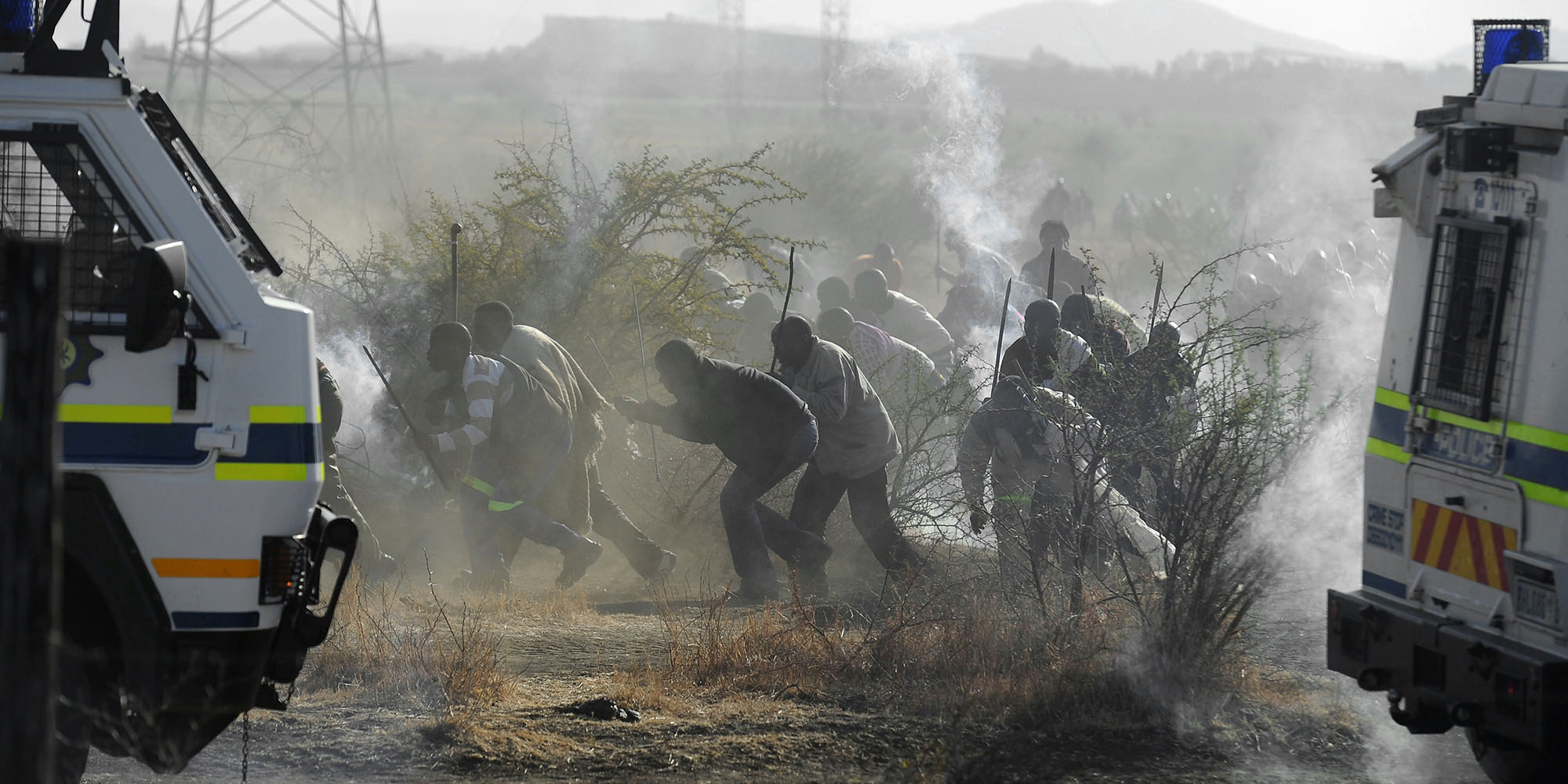
Police officers open fire on striking mineworkers outside the Nkageng informal settlement on August 16, 2012 in North West, South Africa. (Photo by Gallo Images / Foto24 / Felix Dlangamandla)
Since then, there have been a handful of actions taken to achieve accountability and improve the livelihoods of mineworkers and the Marikana community. They have largely come in spite of, and not because of, efforts from government, the platinum company and SAPS.
“They say in this country we’re free, but only some are free, others are not. A policeman has the power to kill and it’s not a big deal. Justice is not a real thing. I have not seen it,” said Nungu.
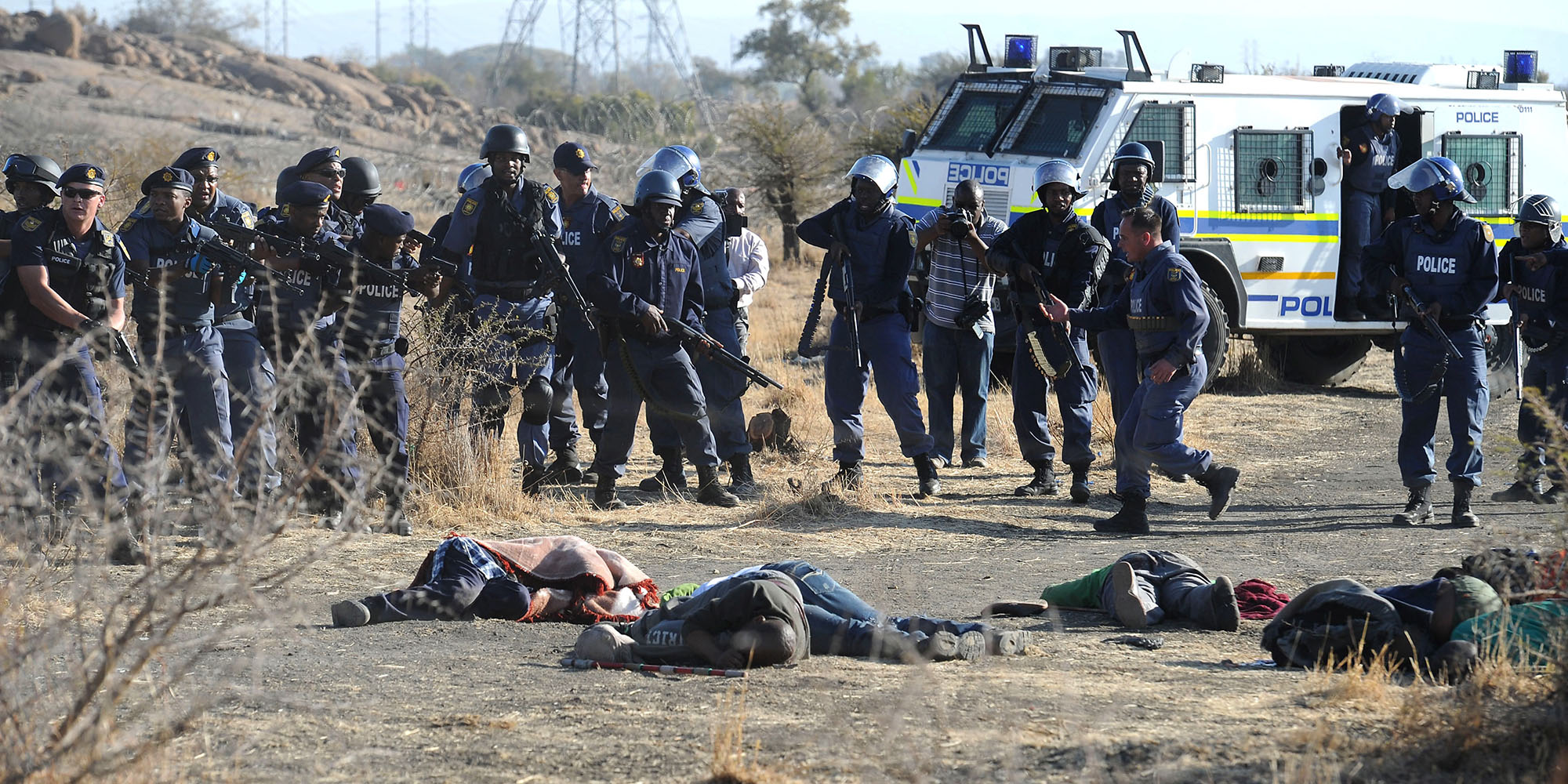
Police officers open fire on striking mineworkers outside the Nkageng informal settlement on August 16, 2012 in North West, South Africa. (Photo by Gallo Images / Foto24 / Felix Dlangamandla)
Mineworker Mlungiseleli Makhatshwe, who still wonders how he survived the police onslaught while he was part of the strike seven years ago, said:
“It pains me that no one has been held accountable for what happened, that the police who were responsible have never been held accountable. There are families who lost loved ones. I also lost my comrades. It’s very difficult because these policemen are free, but us as mineworkers are still oppressed.”
Eight police officers face criminal charges in the North West High Court. They were charged in 2018 for concealing how one injured miner was left to die in a police vehicle on 16 August 2012 and for causing the chaos on 13 August 2012 that led to the killing of two SAPS officers and three mineworkers.
Activists have welcomed the charges, but they are related to the five deaths on 13 August — a gruesome precursor to the massacre — and appear hard to prove, a strange first step for the NPA, which has evidence from the two-year Marikana Commission of Inquiry of more direct failures in SAPS leadership on 16 August as well as cases of cold-blooded murder.
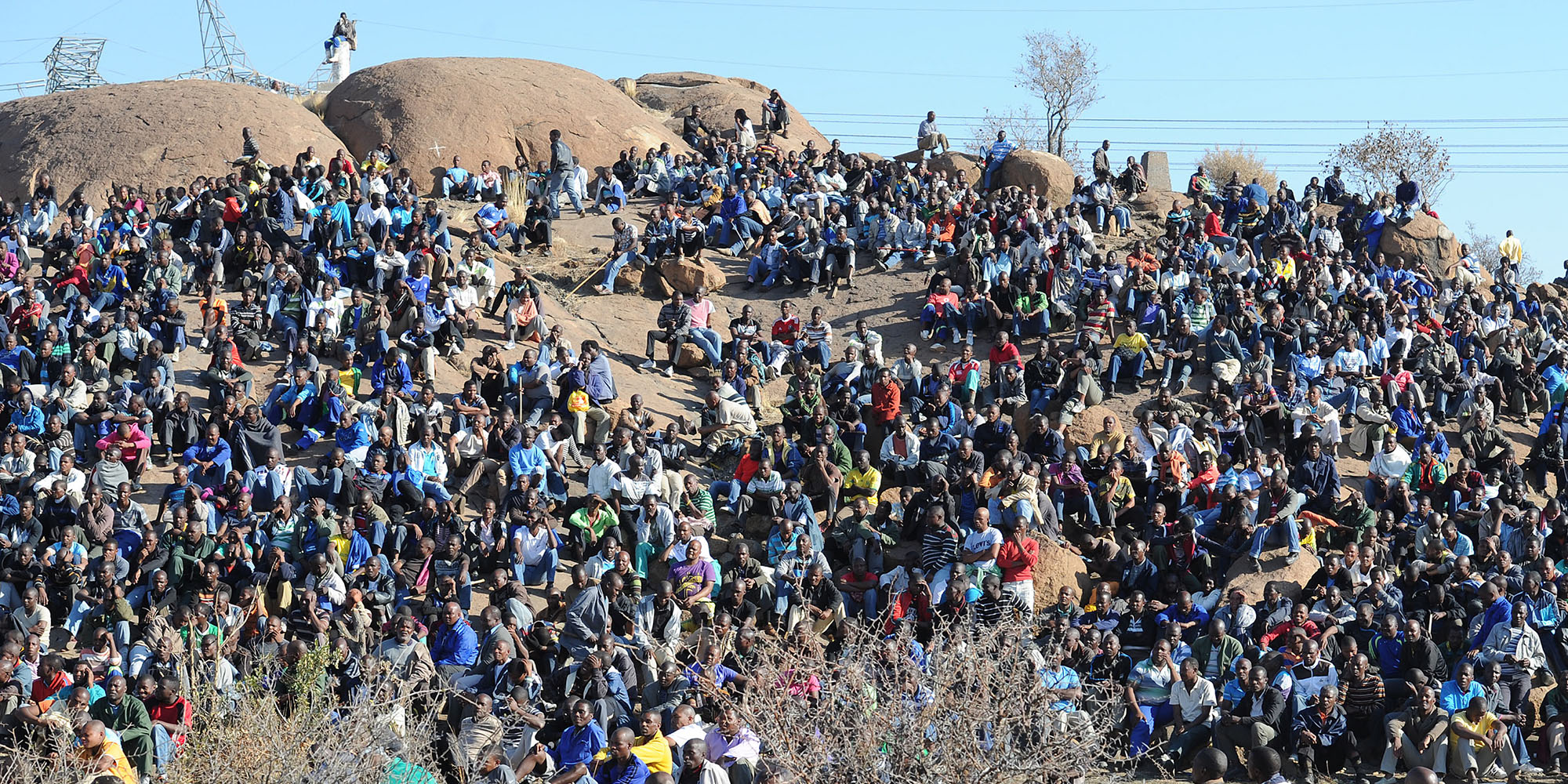
Mineworkers gather to plan a way forward near the Nkaneng informal settlement on 14 August 2012 after clashes at Lonmin’s Marikana mine claimed nine lives. The gathering happened two days before the Marikana massacre. (Photo: Gallo Images / Foto24 / Felix Dlangamandla)
While the cops aren’t the only ones to blame, they have been the most successful in avoiding accountability. Ten people were killed in the week leading up to the massacre. The Marikana Inquiry failed to make conclusive findings, but it heard arguments that striking mineworkers killed two SAPS officers and two mine security guards in the week leading up to the massacre. Three mineworkers thought to be against the strike were also killed.
Until the SAPS officers were recently charged for issues largely unrelated to the massacre, however, accountability has only gone one way. Hundreds of striking mineworkers were initially charged for causing SAPS to kill their own comrades and 17 mineworkers have long faced charges for the violence in the week leading to the massacre.
Like the other dependents of those killed, Nungu only became a part of the violence once her husband was slaughtered. She still wants to know the truth about what happened and to see the culprits charged. She also wants the state to pay her and the other widows and their dependents the compensation they deserve.
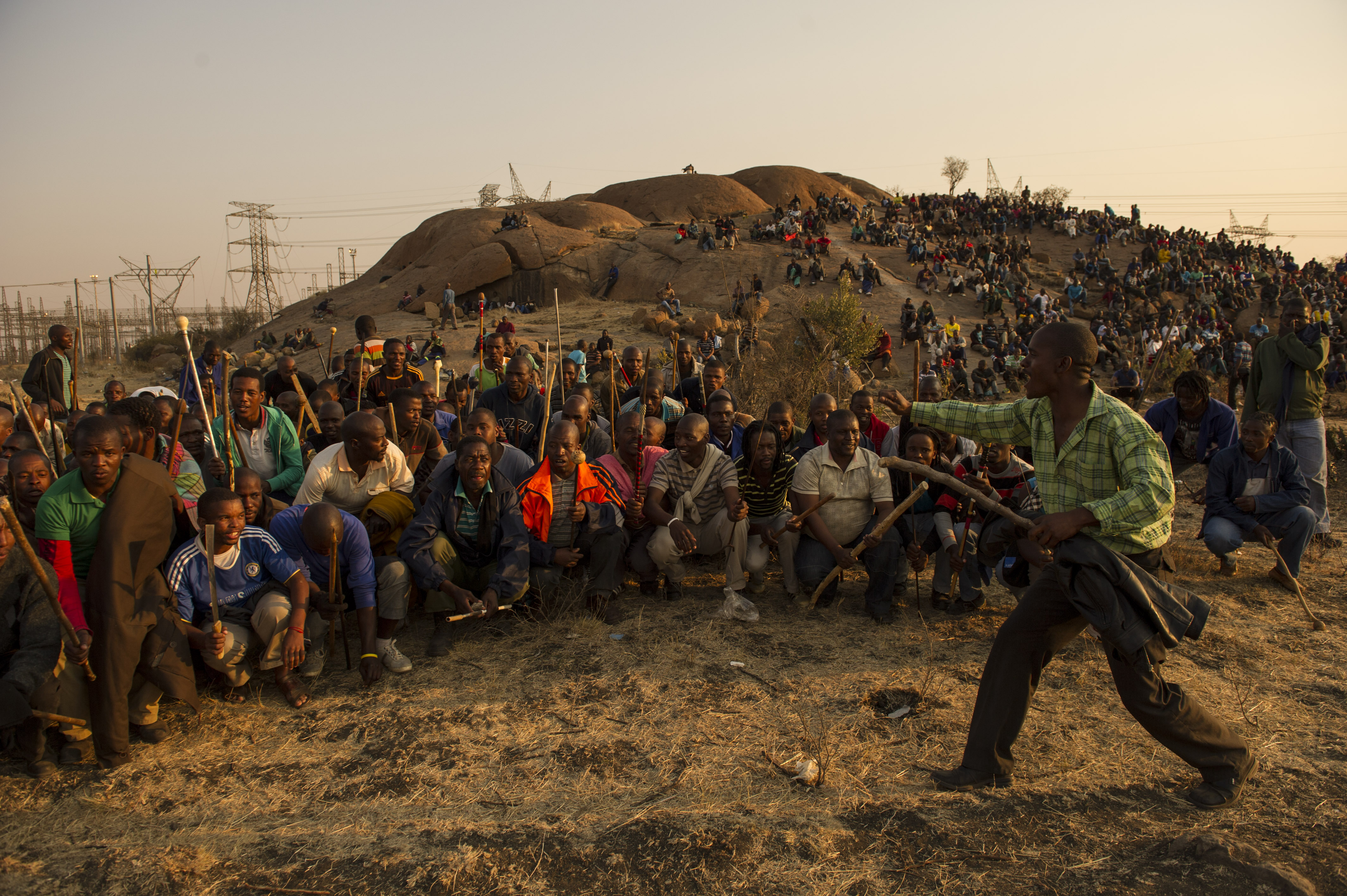
Lonmin employees gather on a hill called Wonderkop at Marikana, outside Rustenburg in the North West Province of South Africa August 15. (Photograph by Greg Marinovich)
“There is a narrative out there that the president compensated the families of the slain miners. However, we have only received a portion of what we were promised,” she said.
“We’re not saying money will replace the void left by the death of our husbands, or that it will erase the pain, but it would be something to show that government cares about us.”
In 2018, the government agreed to pay compensation for loss of support to the families of those who were killed. The families are arguing they should be paid R1.5-million each for the pain they suffered beyond losing their breadwinners. Those injured are still fighting to receive any compensation.
In the wake of the massacre, Lonmin offered jobs to the family members of the deceased and offered to pay the school fees for their children, education which at least one report has suggested is sub-par.
Living conditions were a major driver behind the 2012 strike and Lonmin committed to improvements such as upgrading single-sex hostels for workers to bachelor and family units, but Marikana residents complain that little has changed, either for workers or the surrounding community still dependent on the economy generated by the mine.
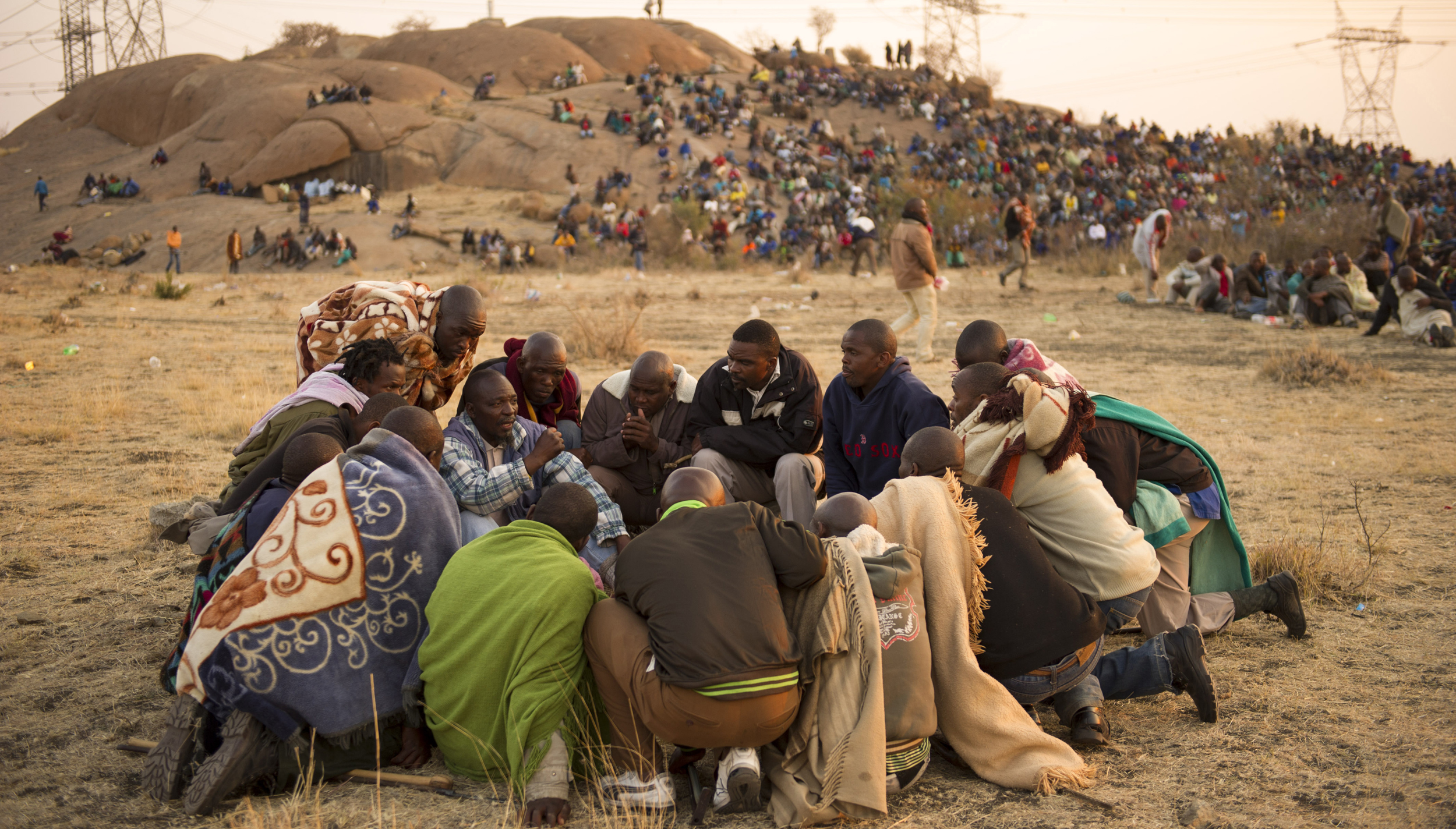
Lonmin employees gather on a hill called Wonderkop at Marikana, outside Rustenburg in the North West Province of South Africa August 15, 2018. Photo by Greg Marinovich
Local activist Wiseman Dibakwe, who has worked for a nearby mine since 2013, said:
“The 2012 massacre could have been something that is teaching the government, the mines, the community, the municipality that they must get together, they must come with a solution to solve, eradicate poverty, unemployment.”
“Go around the location, you’ll see the community are suffering that because they believed that one day things will be right, but since the whole years that I’ve been staying here I’ve never seen any progress.”
The 2012 strikes, first at Impala Platinum and then Lonmin, focused on the fight for a living wage, a basic salary of R12,500 a month. Salaries in the platinum sector have since moved closer to that goal, but workers say those increases aren’t yet making a significant difference in their lives.
“After the strike, there was a change. We were able to earn a slightly better salary. Though even today we haven’t reached that R12,500, which we were promised in the aftermath of the strike, but at least it’s a bit better,” said mineworker Austin Mofokeng, who was part of the 2012 strike.
“The working conditions can only improve when our employer takes us seriously. For example, when we’re underground, they could have a doctor or nurse nearby so that if there is an emergency (we) can get medical assistance as soon as possible.”
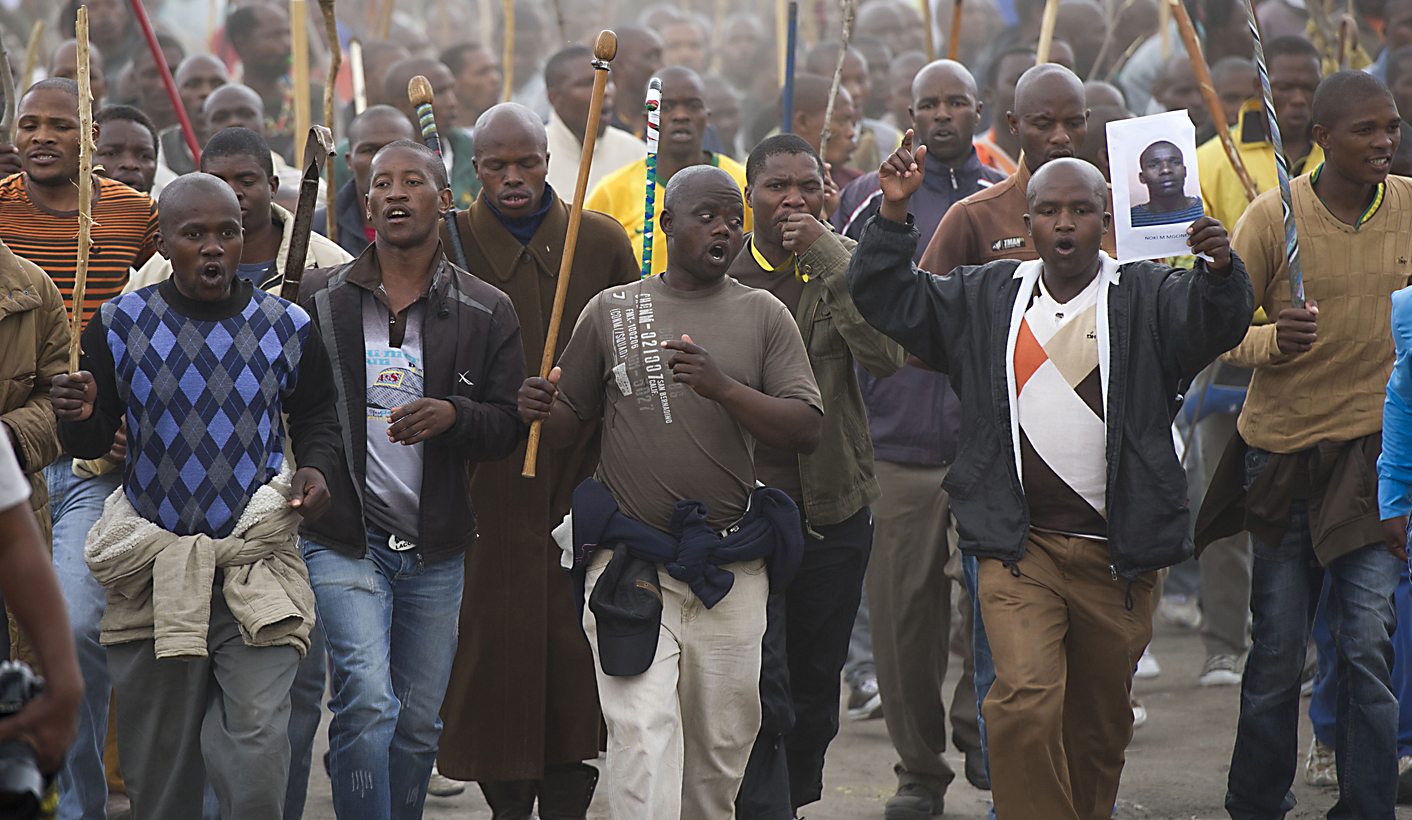
Photo by Greg Marinovich
Demands in Marikana often centre on two institutions. The first is the mining company. The community wants it to help improve services and boost the local economy, while workers want decent living standards and improved wages and conditions. But after Sibanye-Stillwater recently took over Lonmin, many workers just want to avoid potential job losses and uncertainty as they continue to fight for better wages in current negotiations.
The second is the government and its leader, President Cyril Ramaphosa, who was accused of causing the massacre when he called for “concomitant action” during the 2012 strike while he was a Lonmin shareholder.
“The government hasn’t even come to us, even when president Zuma was in power, he never once came to Marikana to apologise for what had happened in his country. Zuma is no longer in office and there is a new president, Cyril Ramaphosa. He too has never come to see us. Plus, if there is one person who knows what happened at Marikana, it’s him,” said Nungu in her workers’ quarters.
It’s unlikely Ramaphosa will ever visit, despite his commitments. The president rarely faces criticism over Marikana after the commission of inquiry found he was not the cause of the massacre and the plight of the workers and community has largely disappeared from the public eye.
It also appears unlikely that there will be any significant moves towards achieving justice or developing the community soon, despite ongoing efforts from a committed group of lawyers and activists.
“My life was great when my husband was around,” said Nungu, who now has to fill her husband’s shoes at the mine in order to provide for her children.
“I only agreed to this job because I didn’t really have a choice, I needed the money. So I agreed to take up my husband’s space, even though it was difficult”. DM




















 Become an Insider
Become an Insider